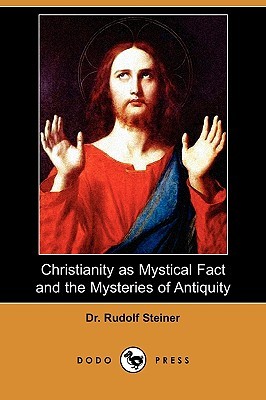
- We will send in 10–14 business days.
- Author: Rudolf Steiner
- Publisher: Dodo Press
- Year: 2009
- Pages: 126
- ISBN-10: 1409972356
- ISBN-13: 9781409972358
- Format: 15.2 x 22.9 x 0.8 cm, minkšti viršeliai
- Language: English
- SAVE -10% with code: EXTRA
Christianity as Mystical Fact and the Mysteries of Antiquity (Dodo Press) (e-book) (used book) | bookbook.eu
Reviews
Description
Dr. Rudolf Steiner (1861-1925) was an Austrian philosopher, literary scholar, educator, architect, playwright, social thinker, and esotericist. After gaining initial recognition as a literary critic and cultural philosopher, at the beginning of the twentieth century he founded a new spiritual movement, Anthroposophy, as an esoteric philosophy growing out of European transcendentalist roots yet with links to the more Eastern-influenced Theosophy. In 1888, as a result of his work for the Kurschner edition of Goethe's works, Steiner was invited to work as an editor at the Goethe archives in Weimar. Steiner remained with the archive until 1896. As well as the introductions for and commentaries to four volumes of Goethe's scientific writings, Steiner wrote two books about Goethe's philosophy: The Theory of Knowledge Implicit in Goethe's World-Conception (1886) and Goethe's Conception of the World (1897). During his time at the archives, Steiner wrote what he considered his most important philosophical work, Die Philosophie der Freiheit (The Philosophy of Freedom) (1894), an exploration of epistemology and ethics that suggested a path upon which humans can become spiritually free beings.
- Author: Rudolf Steiner
- Publisher: Dodo Press
- Year: 2009
- Pages: 126
- ISBN-10: 1409972356
- ISBN-13: 9781409972358
- Format: 15.2 x 22.9 x 0.8 cm, minkšti viršeliai
- Language: English English
Dr. Rudolf Steiner (1861-1925) was an Austrian philosopher, literary scholar, educator, architect, playwright, social thinker, and esotericist. After gaining initial recognition as a literary critic and cultural philosopher, at the beginning of the twentieth century he founded a new spiritual movement, Anthroposophy, as an esoteric philosophy growing out of European transcendentalist roots yet with links to the more Eastern-influenced Theosophy. In 1888, as a result of his work for the Kurschner edition of Goethe's works, Steiner was invited to work as an editor at the Goethe archives in Weimar. Steiner remained with the archive until 1896. As well as the introductions for and commentaries to four volumes of Goethe's scientific writings, Steiner wrote two books about Goethe's philosophy: The Theory of Knowledge Implicit in Goethe's World-Conception (1886) and Goethe's Conception of the World (1897). During his time at the archives, Steiner wrote what he considered his most important philosophical work, Die Philosophie der Freiheit (The Philosophy of Freedom) (1894), an exploration of epistemology and ethics that suggested a path upon which humans can become spiritually free beings.


Reviews